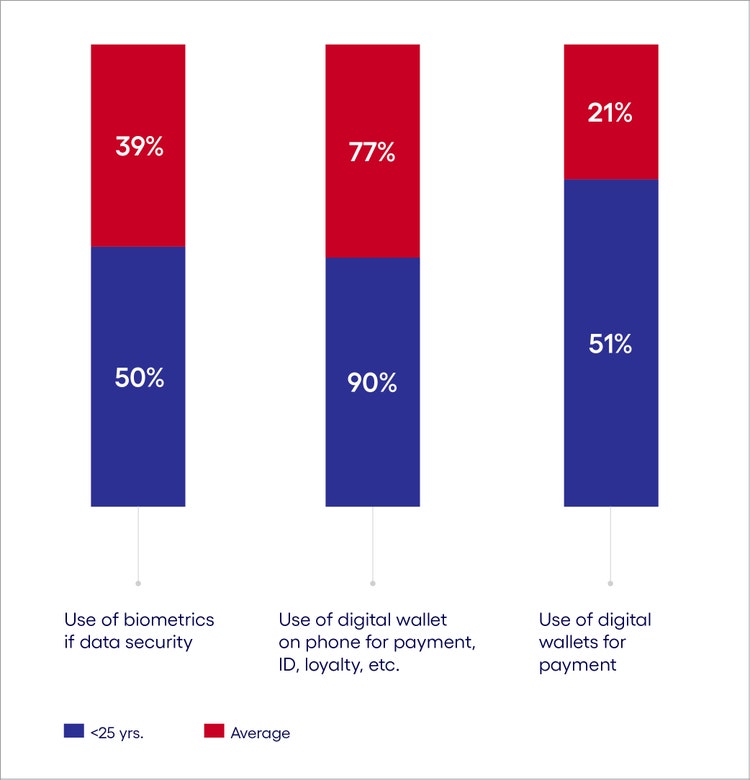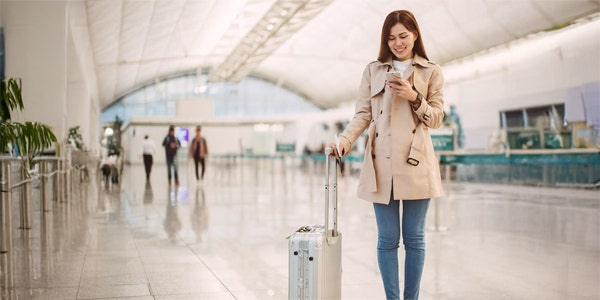<p><br> <span class="small">December 10, 2024</span></p>
Flying smarter: 3 ways AI will improve airline mobile apps in 2025
<p><b>We explore three cutting-edge AI strategies that leading airlines are embracing for customer trust, loyalty and satisfaction.</b></p>
<p>The airline industry is not just about transporting passengers from one destination to another; it’s about creating memorable experiences that foster loyalty and keep customers coming back.</p> <p>Achieving this, however, is easier said than done—especially at the moment. The<a href="https://www.jdpower.com/business/press-releases/2024-north-america-airline-satisfaction-study" target="_blank"> J.D. Power 2024 North American Airline Satisfaction study</a>, which evaluates airlines on criteria such as airline staff, digital tools, ease of travel, on-board experience, and value for money, revealed that overall satisfaction scores slumped across the board compared to 2023. The top airline, Southwest Airlines, received a score of 685 out of 1,000, a notable drop from the previous year’s winning score of 827.</p> <p>But while satisfaction levels may have dipped, there’s every reason to believe they’ll soon soar to new heights. Why? Technology. Increasingly, flyers are taking advantage of the investments carriers have made in their mobile apps and IT systems for a faster, touch-free customer experience.</p> <p>Research from the <a href="https://www.iata.org/en/publications/manuals/global-passenger-survey/" target="_blank">2024 IATA Global Passenger Survey</a> shows travelers becoming more willing to use technology to improve their travel experience. This is especially true among passengers who are 25 or younger, suggesting potential for targeted solutions.</p>

#
<p><span class="small">Source: 2024 IATA Global Passenger Survey<br> Figure 1</span></p> <p>But even passengers older than 25 are now willing to use biometrics, digital wallets for loyalty programs and digital wallets for payment. Additionally, in 2023, <a href="https://www.airlines.org/news-update/71-of-americans-satisfied-with-their-air-travel-experience/" target="_blank" rel="noopener noreferrer">more than half</a> of flyers checked-in using their mobile device, while <a href="https://www.airlines.org/news-update/71-of-americans-satisfied-with-their-air-travel-experience/" target="_blank" rel="noopener noreferrer">88%</a> of American travelers checked-in electronically.</p> <p>These are all signs of an industry-wide embrace of technology in daily operations. From seamless check-ins and digital boarding passes to real-time flight updates and personalized notifications, mobile apps are the new cornerstones of passenger convenience.</p> <p>With the advent of AI, what’s more, these apps are becoming more intelligent and intuitive, establishing a new benchmark for efficiency and customer satisfaction in air travel. In this article, we explore three cutting-edge AI trends that leading airlines are embracing, and how these advancements are enhancing mobile app experiences to foster greater customer trust, loyalty and satisfaction.</p> <h4>Apps and AI: what’s here, what’s coming</h4> <h5><span style="font-weight: normal;"><span class="text-bold-italic">1.</span> AI voice assistants</span></h5> <p>Many airlines are already deploying AI-powered chatbots and virtual assistants to handle basic customer inquiries, but some are pushing the boundaries even further.</p> <p>In July 2024, <a href="https://www.futuretravelexperience.com/2021/04/wizz-air-unveils-new-chatbot-service/" target="_blank" rel="noopener noreferrer">Wizz Air introduced an AI voice assistant</a>, “Amelia,” who provides real-time support during flight disruptions. If a flight is delayed or canceled, Amelia proactively contacts passengers and—addressing them by name throughout—provides them with updates and options for managing their altered travel plans, a 120% Wizz credit or a 100% refund to the original payment method. Amelia can also assist passengers in securing overnight accommodations, tracking down (human) airport representatives for further assistance. If all else fails, she can direct customers to airport information desks or Wizz Air’s Special Assistance line.</p> <p>Amelia’s one-on-one attention lends a personal touch to the passenger experience. This innovative use of AI sets a new standard of customer care and is a strong, sure-to-be-emulated example of how AI can be leveraged to create a more seamless, satisfying travel experience.</p> <h5><span style="font-weight: normal;"><span class="text-bold-italic">2.</span> Travel media networks</span></h5> <p>Long before AI went mainstream, airline passengers had grown accustomed to a wide selection of in-flight entertainment delivered via seatback video systems. Interaction with these systems, in 2025, will increasingly happen within the same airline mobile apps that handle check-in, boarding and other aspects of the passenger experience. This will give passengers a new level of control over the movies, TV shows, music, and other content that help enrich their hours in transit.</p> <p>This shift will also benefit airlines. In June, to give one illustration, United Airlines launched <a href="https://kinectivemedia.com/" target="_blank" rel="noopener noreferrer">Kinective Media</a>, a media network that allows brands to deliver personalized advertising and offers to travelers through the airline’s mobile app. This advertising technology platform leverages anonymized audience segments, enabling marketers armed with AI-derived insights into customers’ preferences to target their campaigns with precision.</p> <p>Crucially, the Kinective Media system lets customers opt out of targeted advertising (at least in the U.S.) and does not share United customers’ personal information with third parties. While reports suggest that <a href="https://www.pymnts.com/news/retail/2024/wolt-retail-media-is-the-future-of-ecommerce-marketing/" target="_blank" rel="noopener noreferrer">71%</a> of shoppers who receive personalized offers are interested in them, some still do find them intrusive. The opt-out feature is essential to establishing and maintaining trust, reinforcing customers’ confidence in United's commitment to privacy.</p> <h5><span style="font-weight: normal;"><span class="text-bold-italic">3.</span> Personalized travel recommendations</span></h5> <p>Airlines are also increasingly using AI to analyze customer preferences and travel history, then offering tailored suggestions for destinations, activities and services.</p> <p>Lufthansa Group <a href="https://innovation-runway.lufthansagroup.com/en/focus-areas-projects/projects/openai.html" target="_blank" rel="noopener noreferrer">introduced an AI-powered travel advisor named “Holly</a>” that can provide personalized travel recommendations and allows for immediate booking of complete package holidays, taking into account personal preferences, hotel reviews and excursions available. It doesn’t stop there. Lufthansa Group also offers a ChatGPT-power packing-list generator that creates personalized packing lists based on the specifics of a passenger’s flight. The tool can consider several variables, including destination, season and planned activities.</p> <p>These features are now integrated within a mobile app that was, already, the industry “gold standard.” Each year, the World Aviation Festival hosts a <a href="https://worldaviationfestival.com/blog/airlines/first-three-finalists-announced-for-the-battle-of-the-airline-apps/" target="_blank" rel="noopener noreferrer">‘Battle of the Airline Apps’</a> to determine which app best delivers a seamless, frictionless, and simple passenger experience. In the latest competition, the three finalists were Air India, Emirates, and Lufthansa Group, with Lufthansa emerging as the winner.</p> <p>By integrating AI into their services, Lufthansa Group is building on this advantage: enhancing the travel-planning experience and ensuring passengers are well-prepared for their journeys, fulfilling the airline’s commitment to making travel more seamless and personalized for its many customers.</p>

#
<h4><br> Driving the change with AI</h4> <p>The integration of AI within airline mobile apps is as exciting as it is inevitable. As these changes unfold, the key to fostering customer loyalty and driving growth is to honor these four principles:</p> <ol> <li><b>Prioritize data privacy. </b>In an era where data breaches are a constant concern to airline customers— a recent survey found that <a href="https://www.iata.org/en/publications/manuals/global-passenger-survey/" style="background-color: rgb(255,255,255);" target="_blank" rel="noopener noreferrer">39%</a> expressed hesitation around using biometrics, unless reassured about data security—maintaining passenger trust is paramount. As United has done with Kinective Media, airlines must ensure that their AI systems adhere to stringent data privacy standards, protecting customer information with the highest levels of security.<br> <br> </li> <li><b>Incentivize the use of AI services. </b>Studies show that <a href="https://www.forbes.com/councils/forbestechcouncil/2021/11/09/why-personalization-is-the-holy-grail-of-loyalty/" target="_blank" rel="noopener noreferrer">80%</a> of consumers are more likely to interact with a brand if they receive personalized offers or rewards. By offering incentives such as loyalty points, discounts, or exclusive services, airlines can help boost customer engagement with their mobile apps, and with the new AI-powered features within them.<br> <br> </li> <li><b>Listen to feedback. </b>AI has the potential to revolutionize the collection and analysis of real-time customer feedback. Airlines can leverage these insights to continually refine their services and swiftly resolve any issues, showcasing their dedication to customer satisfaction. By empowering and training associates, airlines can proactively address concerns before they arise or find effective ways to rectify them after the fact.<br> <br> <b></b></li> <li><b>Forge strategic partnerships for innovation. </b>Collaborating with tech companies and startups can give airlines fresh ideas and grant them access to the newest AI solutions as they come online. From loyalty transformation to contact-center and agent-assist capabilities, technology partnerships are critical if airlines want to stay responsive to evolving passenger needs and foster a culture of continuous improvement.<b></b></li> </ol> <h4>Seamless and stress-free experiences start now</h4> <p>As AI becomes integrated into every aspect of a passenger’s journey; the future of air travel looks brighter than ever. Travelers can look forward to highly personalized and hassle-free experiences, establishing seamless travel as the new standard. With mobile apps becoming more smart, intuitive, and efficient by the day, airlines are poised to reap significant benefits, with customer loyalty and satisfaction chief among them.<br> </p>
<p>Linda Murphy leads the Travel & Hospitality practice at Cognizant for the GGM market. In her role, she specializes in in guiding premier airlines and airports toward more intuitive operations and advanced automation.</p>


